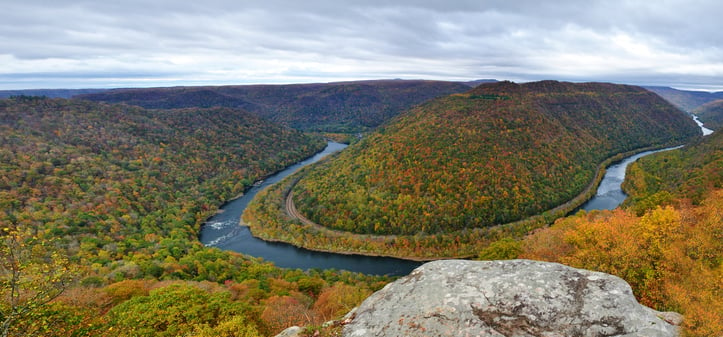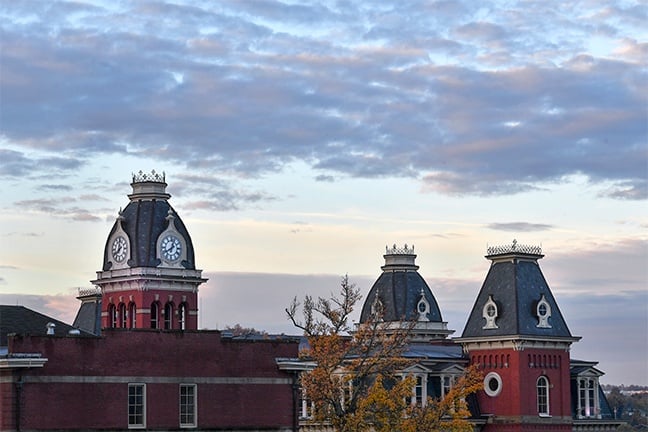 Thinking about becoming a Mountaineer? I may be biased, but you can’t go wrong with West Virginia where you get unparalleled opportunities both inside and outside the classroom.
Thinking about becoming a Mountaineer? I may be biased, but you can’t go wrong with West Virginia where you get unparalleled opportunities both inside and outside the classroom.
You probably have a good idea of what it’s like to go to graduate school, but what exactly can you look forward to as a graduate student at WVU? I’m glad you asked.
Let’s start at the beginning.
Did you know that West Virginia University is a land-grant university? President Abraham Lincoln signed the Morrill Act, offering land grants to states that agreed to start a college that teaches agriculture and the “mechanic arts” (a.k.a. engineering). The next year, West Virginia’s state legislature accepted the terms of the Morrill Act to start the new land-grant college named the Agricultural College of West Virginia.
In 1868, the school became West Virginia University.
What about WVU’s academic status?
From humble beginnings, WVU has distinguished itself as a top academic institution. It’s classified as an R1 university – the highest research classification doctoral universities can receive by the Carnegie Classification of Institutions of Higher Education. R1 institutions are at the forefront of research and innovation and receive federal or private funding specifically for their academic research.
Graduate programs and students make innovative contributions that impact their field and the world, like this groundbreaking project that studies the side effects of chemotherapy on breast cancer or this research led by a PhD student pursuing a graduate degree in Public Health in order to help fight the national opioid crisis. As a graduate student at West Virginia University, there’ll be no shortage of interesting opportunities for you to study, create, experiment, and grow in your field.
What about extracurriculars in the state of West Virginia?
If you’re looking for ways to take a break from academics, you’ll have a lot of options in West Virginia and nearby. The WVU Mountaineers compete in NCAA Division I athletics, and its 17 varsity teams participate in the Big 12 Conference. When the weather turns cooler and the leaves start to turn, all of Morgantown comes out to cheer on the Mountaineer football team, donning their best blue and gold to show team spirit. Whether it’s football at Mountaineer field, basketball at the Coliseum, or another sport you love, there’s always a game to watch and a team to support at WVU.
Sports may not rank at the top of your list of things to do. Don’t fret – Morgantown has a lot to offer for graduate students. If you’re into the food scene, you can’t go wrong sampling the many restaurants and cafes in downtown Morgantown. The Wharf District that lines the Monongahela river has been renovated, and this small city has earned a lot of well-deserved recognition, including Best Food City in West Virginia, Top 20 Best College Towns, and a Best City for Summer Internships!
What about what’s close?
Outside of Morgantown, you’ll see that West Virginia is a nature lover’s paradise. Don’t forget to pack your outdoor gear because you may just spend your free time kayaking in Cheat Lake, hiking in the Canaan Valley and Blackwater Falls State Park, or climbing at Seneca Rocks. If you’re not an outdoors person, you’ll soon become one when you see how wild and wonderful West Virginia truly is.
However, if city life is more your speed, Pittsburgh is only 70 miles north of Morgantown, and Cleveland and Washington, D.C., are under 4 hours away. So, you’re never at a loss of things to do – whether you love the indoors or outdoors!
West Virginia is a unique place, and WVU offers graduate students a well-rounded experience with top-rated academics and quality student life. Choosing a graduate school can be a tough decision, but seeing is believing, as the saying goes, so I invite you to visit our campus at any time and see for yourself how much West Virginia University exceeds your expectations!
Need additional help preparing for the GRE? Check out our digital resource —The GRE Cheat Sheet — and let us help you prepare to ace the GRE!









